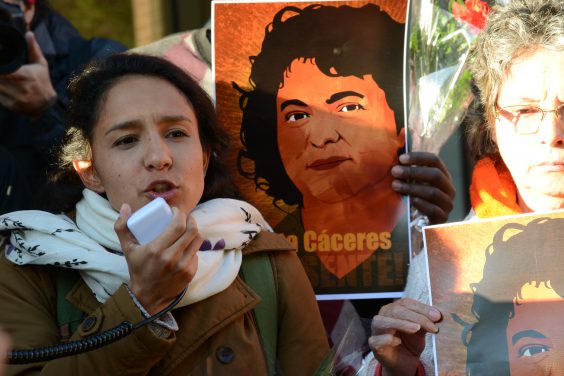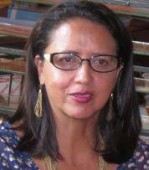Punishment for Attacks on Human Rights Defenders
by Dina Meza Translated by Katherine Wingfield-Dobbs / May 27, 2016 / No comments

Daughter of Berta Cáceres during a protest for Berta Cáceres’ assassination.
Image via Flickr user: Comision Interamericana de Derechos Humanos
The detention of an alleged gunman in the murder of activist Bertha Cáceres does not hold those who ordered the killing accountable.
The capture of the alleged perpetrators of the crime against Bertha Cáceres – leader of the indigenous Lenca people and defender of the rights of her people – occurred on May 2, 2016, two months after her assassination. No one thought the detentions strange as, in my country, this type of thing occurs: they detain the alleged gunmen and never find the whereabouts of those who ordered the killings. That seems a sinister pact because a few months or years later, those detained walk free due to a lack of evidence and sometimes, it is not even made public.

- Honduras has one of the world’s highest murder rates. It is also one of the most dangerous countries to practice journalism, ranking 129th out of 180 in the 2014 World Press Freedom Index. Journalists are regularly threatened, attacked, and killed for their work. The Honduran government fails to punish those who use violence against reporters, essentially granting them impunity. This space will be dedicated to examining the lack of protection for Honduran journalists exercising their profession. Topics will include the use of state-sponsored advertising as a mechanism to reward or punish publications, and censorship and self-censorship as hindrances to democratic progress.

- Born in Cofradía, Honduras, Dina Meza has been recognized by PEN International, Amnesty International, Index on Censorship and Reporters without Borders for her work as a journalist and human rights advocate. Currently, Dina is the driving force behind the creation of Honduras PEN Centre. In 2013, she wrote “Reign of Terror,” an in-depth report on threats to Honduran journalists for Index on Censorship’s magazine. In 2014, she was named one of Reporters Without Borders’ “100 Heroes and Heroines of Information.”
I say the above knowingly and with much pain in my heart.
On December 4, 2006 the attorney, Dionisio Díaz García, was assassinated, suffering multiple gunshot wounds, when he was on his way to the Supreme Court of Justice. He defended the labor rights of security guards – a group whom no one wants to represent as they are the owners of security companies and are military, ex-military and police.
We worked together with Dionisio to do this job. We knew the stories of men and women who had to suffer many violations of their labor rights only to receive a reduced wage at the end of the month.
Days before the crime there had been various security incidents and a few months before the crime, we took the complaint to the Comisionado Nacional de Derechos Humanos (National Commission for Human Rights), headed up by Ramón Custodio López. But this official did nothing – he proceeded to close the file saying that it was not within his remit. I know this because I was the one who opened the complaint and who was told that the file had been closed.
Two men were caught and sentenced to prison on February 27, 2009. According to the Public Ministry, they were the masterminds of the crime against attorney Dionisio, but they were released in 2012 due to lack of evidence. They never pursued those behind it, despite having prima facie evidence that his death was a result of defending security guards.
The same happened with Bertha Cáceres. She made several complaints to the state with respect to threats she received and the head of the Agencia Técnica de Investigación Criminal (Technical Agency of Criminal Investigation) indicated that she was killed as a result of her work defending the environment. But no one in the government did anything in spite of her having precautionary measures from the Inter-American Commission on Human Rights. But international pressure was needed to produce the first arrests – there is now a fifth person detained.
But there is no mention of the masterminds who have been reported by Bertha Cáceres’ family: public officials from Desarrollos Energéticos S.A. (DESA), a hydroelectricity company. Although the President of the Republic says he feels satisfied by the arrests, the truth is that he avoids discussing the issue of the instigators and of punishing the level of violence generated in Rio Blanco each time the Lenca wish to demand justice alongside national and international missions. But what happens is that they are attacked and although everything is public, the State acts the fool over the issue.
Who cares about impunity in Honduras? That word has such connotations which allow the repetition of crimes. Who likes to dance to the sound of that situation? Why are the masterminds happy, no one able to touch them?
According to Global Witness, Honduras is the most dangerous place for environmental advocacy. There have been 101 assassinations between 2010 and 2014 – 40 percent of these victims were indigenous people and the main cause of their deaths were the hydroelectric, mining and agro-industries.
According to a 2016 report regarding the human rights situation in Honduras, the Inter-American Commission on Human Rights stated that: “Honduras should protect defenders when they encounter risks to their life and personal integrity, by adopting an effective and comprehensive prevention strategy, with the goal of preventing attacks.” This was indicated by Commissioner José de Jesús Orozco, the Spokesperson for the Rights of Defenders of Human Rights.
But that is a dream. At this stage there is no political will. Instead, there is a stigma against the work of human rights defenders. The security teams of the Honduran State and the majority of public officials see the defenders of human rights as their enemies.
Very recently, when I arrived on May 9, 2016 together with other defenders to manage the freedom of three indigenous Lenca who were detained at a peaceful demonstration, an official of the Presidential Honor Guard of President Juan Orlando Hernández threatened to report me because I wrote about him in the newspaper pasosdeanimalgrande.com. He tried to frighten me because I complained that they were shooting videos and taking photographs of us, the defenders who were there. He told me: “Be grateful I have not reported you for everything you wrote in that newspaper.”
Those immortal phrases against life are those which threaten the security of those of us who are journalists or who defend human rights. What is regrettable is that the state still shows no signs of changing, of moving from threats to rectification…when that happens, Honduras will be changing!




